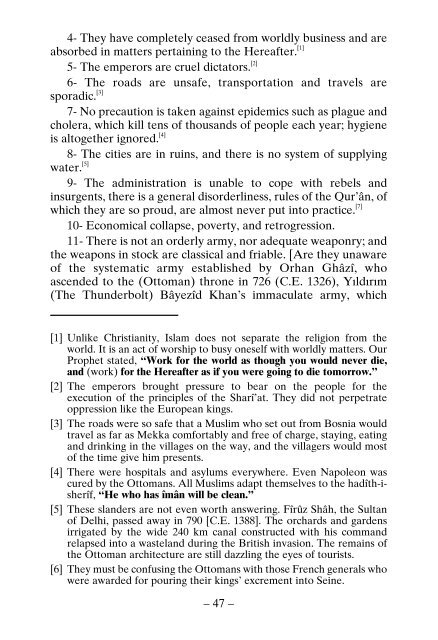Confessions Of A British Spy
Muhammad of Najd was the sort I had been looking for. For his scorn for the time’s scholars, his slighting even the (earliest) four Khalîfas, his having an independent view in understanding the Qur’ân and the Sunna were his most vulnerable points to hunt and obtain him. So different this conceited youngster was from that Ahmed Efendi who had taught me in Istanbul! That scholar, like his predecessors, was reminiscent of a mountain. No power would be able to move him. Whenever he mentioned the name of Abû Hanîfa, he would stand up, go and make an ablution. Whenever he meant to hold the book of Hadîth named he would, again, make an ablution. The Sunnîs trust this book very much. Muhammed of Najd, on the other hand, disdained Abû Hanîfa very much. He would say, “I know better than Abû Hanîfa did. In addition, according to him, half of the book of wrong.
Muhammad of Najd was the sort I had been looking for. For
his scorn for the time’s scholars, his slighting even the (earliest)
four Khalîfas, his having an independent view in understanding
the Qur’ân and the Sunna were his most vulnerable points to hunt
and obtain him. So different this conceited youngster was from
that Ahmed Efendi who had taught me in Istanbul! That scholar,
like his predecessors, was reminiscent of a mountain. No power
would be able to move him. Whenever he mentioned the name of
Abû Hanîfa, he would stand up, go and make an ablution.
Whenever he meant to hold the book of Hadîth named he would, again, make an ablution. The Sunnîs trust this book
very much.
Muhammed of Najd, on the other hand, disdained Abû Hanîfa
very much. He would say, “I know better than Abû Hanîfa did.
In addition, according to him, half of the book of wrong.
Create successful ePaper yourself
Turn your PDF publications into a flip-book with our unique Google optimized e-Paper software.
4- They have completely ceased from worldly business and are<br />
absorbed in matters pertaining to the Hereafter. [1]<br />
5- The emperors are cruel dictators. [2]<br />
6- The roads are unsafe, transportation and travels are<br />
sporadic. [3]<br />
7- No precaution is taken against epidemics such as plague and<br />
cholera, which kill tens of thousands of people each year; hygiene<br />
is altogether ignored. [4]<br />
8- The cities are in ruins, and there is no system of supplying<br />
water. [5]<br />
9- The administration is unable to cope with rebels and<br />
insurgents, there is a general disorderliness, rules of the Qur’ân, of<br />
which they are so proud, are almost never put into practice. [7]<br />
10- Economical collapse, poverty, and retrogression.<br />
11- There is not an orderly army, nor adequate weaponry; and<br />
the weapons in stock are classical and friable. [Are they unaware<br />
of the systematic army established by Orhan Ghâzî, who<br />
ascended to the (Ottoman) throne in 726 (C.E. 1326), Yıldırım<br />
(The Thunderbolt) Bâyezîd Khan’s immaculate army, which<br />
[1] Unlike Christianity, Islam does not separate the religion from the<br />
world. It is an act of worship to busy oneself with worldly matters. Our<br />
Prophet stated, “Work for the world as though you would never die,<br />
and (work) for the Hereafter as if you were going to die tomorrow.”<br />
[2] The emperors brought pressure to bear on the people for the<br />
execution of the principles of the Sharî’at. They did not perpetrate<br />
oppression like the European kings.<br />
[3] The roads were so safe that a Muslim who set out from Bosnia would<br />
travel as far as Mekka comfortably and free of charge, staying, eating<br />
and drinking in the villages on the way, and the villagers would most<br />
of the time give him presents.<br />
[4] There were hospitals and asylums everywhere. Even Napoleon was<br />
cured by the Ottomans. All Muslims adapt themselves to the hadîth-isherîf,<br />
“He who has îmân will be clean.”<br />
[5] These slanders are not even worth answering. Fîrûz Shâh, the Sultan<br />
of Delhi, passed away in 790 [C.E. 1388]. The orchards and gardens<br />
irrigated by the wide 240 km canal constructed with his command<br />
relapsed into a wasteland during the <strong>British</strong> invasion. The remains of<br />
the Ottoman architecture are still dazzling the eyes of tourists.<br />
[6] They must be confusing the Ottomans with those French generals who<br />
were awarded for pouring their kings’ excrement into Seine.<br />
– 47 –


